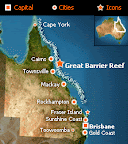
Reef Alarmists Jump The Shark
by Walter Starck
October 9, 2012
Excerpt:
The Great Barrier Reef is doomed again. A recent widely publicised scientific study reports the dramatic finding that it has lost half its coral in last 27 years. 48% of loss is attributed to storm damage, with bleaching & crown-of-thorns starfish being responsible for 10% and 42% respectively. The average annual rate of coral loss over the 27-year period was estimated to be 3.38% and growth was put at 2.85%, leaving a net decline of 0.53% per year. Further effort and research on starfish control is suggested to be the most promising means of reversing the decline. Elimination of the loss due to starfish would leave a net gain of 0.89%.
…
Examples of this include: The margin of error in visual surveys of coral cover is high and unassessed; yet, they are presented to hundredths of a precent without any qualifying explanation, as if they are precisely accurate. Coral cover is highly variable between reefs and over different areas or at different years on the same reef.
…
Is this just another appeal for funding?
There is abundant reason to question the validity of the findings. The imminent demise of the GBR has been an ongoing claim for nearly half a century and has funded a small industry of researchers, bureaucrats and activists devoted to “saving” the Great Barrier Reef from a variety of imagined “threats”. In recent decades this industry has cost the Australian taxpayer well over $100 million per year and the cost has been increasing. Although no practical solutions have ever been found, the demand for hypothetical solutions to imaginary problems seems unlimited.
If this situation were based on a conscious deliberate fraud, it would be bad enough; but, unfortunately it involves something even worse. It arises from a widespread and profound groupthink belief that the reef really is under dire threat and that all the money and effort is actually “saving” it from destruction. Even so, this latest study has implications well beyond just another appeal for funding and deserves to be given serious consideration.
…
To give credit where due, though, reef alarmists have at least managed the extraordinary feat of jumping the shark while shooting themselves in the foot at the same time.
Regardless of the reef-salvation industry’s industry’s motives, its efforts can only be viewed as either honest but incompetent or duplicitous and self-serving. It is time to severely cut the funding for this elaborate and costly farce. By their own reckoning the reef saviours have failed miserably and we can no longer afford them.
Personally, I suspect that the surest way to save the reef would be to cut funding for management and research by half and link future cuts or increases to the balance of economic and environmental outcomes. I have little doubt that would soon effect a miraculous recovery.
Much more here.



